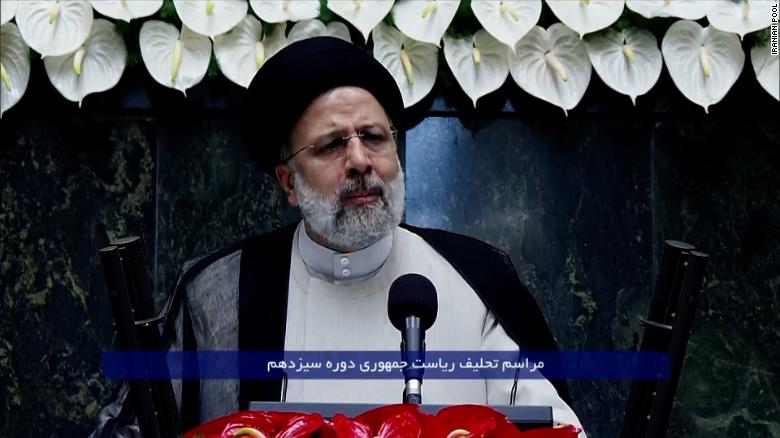Hopes of revived Iran nuclear talks dim amid delays as new hardline president takes office

The When talks paused after a sixth round, among the major outstanding issues still being worked out was how to deal with Iran’s nuclear research and development advances, according to an official familiar with the ongoing talks. The official said Iran was essentially telling the P5 + 1, “tough luck, four years of Trump, we have suffered so much, this was our answer, you can’t take that away from us.”All parties to the talks have a sense of the clock ticking down, this official said. “We all want to return, and we’re determined to work on it, but it’s stating a matter of fact when Blinken says … that negotiations can’t go on forever,” the official said. “As Iran proceeds with enrichment there comes a point when there’s no JCPOA to return to. We’re not there yet.” Hope has ‘slowly been fading’Failure to return to the deal would be a blow to President Joe Biden’s foreign policy agenda. His officials, meanwhile, have fumed privately that they inherited major roadblocks to re-entering the deal from the previous administration and are now thinking through contingency plans. After President Donald Trump pulled out of the deal in 2018 and imposed a maximum pressure campaign on Iran with stiff new sanctions, Iran began developing and testing centrifuges that have shortened the time it would take to produce enough material for a bomb. Officials now believe it would take far less than a year — the “breakout” standard codified in the JCPOA — for Iran to produce enough nuclear material for a weapon. Iran has also been restricting UN inspectors’ access to its main uranium enrichment plant at the Natanz nuclear facility. Hope has “slowly been fading,” said another person familiar with the negotiations, since it became clear that a deal would not be struck before Iran’s elections. That timeline was the US’ original goal, but significant sticking points remained like the scope of sanctions relief — with the US and allies arguing that they can only lift sanctions connected to the nuclear deal, not penalties associated with human rights abuses, conventional weapons violations or other issues. The prospect that the US is also working to “lengthen and strengthen” the deal, as US officials have characterized it, hasn’t helped negotiations. Iran has not yet been willing to commit to discussing non-nuclear issues, such as its ballistic missile program, in follow-up talks. Broadening out the deal has been a priority for more hawkish Democrats like Senate Foreign Relations Committee Chairman Sen. Bob Menendez, who has urged the Biden administration to enter into an agreement “that prevents Iran from ever acquiring nuclear weapons and meaningfully constrains its destabilizing activity throughout the Middle East and its ballistic missile program,” he and 42 other senators wrote in a letter to Biden in the spring. That plea has become more urgent since a new class of Iranian-made drones that can evade US detection began targeting US military assets in Iraq. A ‘bad surprise’ Still, US officials have been caught off guard that the delay in reconvening talks has lasted so long, people involved in the negotiations said.The official familiar with the talks described the length of the hold-up since the election as a “bad surprise,” particularly because Iranian officials had told their counterparts that Tehran would continue the talks once the election was over. There is speculation among the P5 + 1 partners that the delay could be a tactical move by Iran. Increasingly, however, they also believe there is a real debate going on within the Iranian system on how to proceed with negotiations. Not everyone believes a nuclear crisis is inevitable if the JCPOA fails, however. Menendez and Republican Sen. Lindsey Graham have proposed another idea that staffers say has been well-received by the administration — namely, pushing Iran to accept the creation of a nuclear fuel bank for the Persian Gulf region. The idea would be that Iran could only access such a bank, and fuel its commercial nuclear reactors, on the condition that it gives up its domestic uranium enrichment and reprocessing — key components for nuclear weapons.Still, such a solution, even if accepted by Iran, would only address the nuclear issue and not Iran’s broader destabilizing activities throughout the region. Iran’s return to compliance with the JCPOA, even though the deal was limited to Iran’s nuclear activities, was seen by Biden and experts as a crucial jumping off point for further negotiations. Israel, meanwhile, has remained staunchly opposed to re-entering the nuclear deal. The country’s new Prime Minister Naftali Bennett called on the US and its partners to “wake up” to the risks of continuing negotiations, and Israeli officials have indicated that they are willing to take matters into their own hands to stymie Iran’s nuclear program. The former Mossad chief suggested in June that the Israeli intelligence agency played a role in explosions at Namatz in April and last year. “It’s a race against the clock — we can only reenter the deal on our terms, and if we cannot reenter the agreement by the end of the year, it’s possible Iran may have reached a nuclear breakout capability,” said Halie Soifer, a former foreign policy adviser to then-Senator Kamala Harris who now serves as CEO of the Jewish Democratic Council of America. “Ultimately, the Biden administration is committed to preventing Iran from acquiring a nuclear weapon, which is an objective it shares with our allies, including Israel,” Soifer said. But she noted that the US, Israel and Iran all have new governments, and it will take time to coordinate on addressing the nuclear threat and threats to regional stability. “What remains unclear is how much time we have,” she said.






